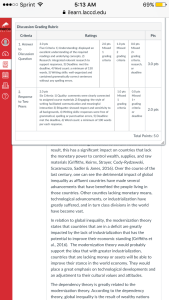Global inequality over the course of the last century has been an issue of great concern.
Global inequality over the course of the last century has been an issue of great concern. Global inequality is best described as directing resources to certain nations. As a result, this has a significant impact on countries that lack the monetary power to control wealth, supplies, and raw materials (Griffiths, Keirns, Strayer, Cody-Rydzewski, Scaramuzzo, Sadler & Jones, 2016). Over the course of the last century, one can see the detrimental impact of global inequality as affluent countries have made several advancements that have benefited the people living in those countries. Other counties lacking monetary means, technological advancements, or industrialization have greatly suffered, and in turn class divisions in the world have become vast.
The dependency theory is greatly related to the modernization theory. According to the dependency theory, global inequality is the result of wealthy nations exploiting impoverished ones, to cause a cycle of dependence (Griffiths et al., 2016). In turn, this creates a system which benefits affluent markets. The dependency theory would probably support the idea that wealthy countries will one day completely dominate the poor ones. Without great change, dependency theorists would state that the world will be run by a select few and that most countries will heavily depend on them for support.
I believe that substantial changes need to be made to help release the burdens of global inequalities. It is unfortunate that a vast majority of the wealth in the world is in the hands of a select few people who control societies around the world. I do think that there should be a just way to ensure that all people in the world are given basic necessities necessary for survival. No one person should have to suffer for food, shelter, and clean water. However, in modern day society, we are witness to millions who are dying because these human needs are not met. I do think that the dire situation needs to change; however, I do not think it is something that can happen overnight. Rich countries and wealthy individuals need to make sacrifices in order to help those in need. Once groups of people see the importance of their sacrifices, I do think we will be able to make changes in the world to alleviate global inequalities.
References
Griffiths, H., Keirns, N., Strayer, E., Cody-Rydzewski, S., Scaramuzzo, G., Sadler, T., . . . Jones,
- (2016). Introduction to sociology (2nded.). Houston, TX: Rice University. Retrieved from https://openstaxcollege.
org/textbooks/introduction…
2nd example
The idea of global inequality considers inequality or stratification between whole countries. There is a division of countries into rich and poor, but inequality means more than just a product per capita.
Relations between countries depend on their status on the scale of stratification.Such relations are mainly economic, but also political and professional.
All human communities are ranked within themselves, except for very primitive ones, which are at the initial stages of their development. Conventionally, the entire history of the development of mankind and each of its communities can be divided into 4 types of inequalities: Slavery,Castes, Estates, Classes.
But countries and states are stratified not only within themselves, but also among themselves. Moreover, global stratification is expressed much more sharply. The distribution of world income, the political influence of planetary scale and economic specialization are the criteria of global stratification. World resources are distributed even more unevenly than in any single country.
The modernization theory is a model of economic and social development in which global inequality is due to technological and cultural differences between societies. It appeared in the 1950s, the time when American society was fascinated by new technology and many people in poor countries were hostile to the United States. Against the background of the growing influence of the socialist Soviet Union throughout the world, American policy makers have developed a pro-market foreign policy line, which we still adhere to.
Dependency theory is a model of economic and social development that explains global inequality by the historical exploitation of poor countries by the rich. Supporters of this view place the main responsibility for world poverty on developed countries. Those systematically exhausted the poor countries, making them dependent on themselves. This destructive process lasted many centuries and continues to this day.
Answer preview Global inequality over the course of the last century has been an issue of great concern.
APA
213 words


